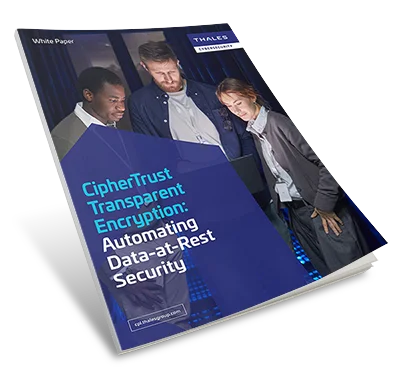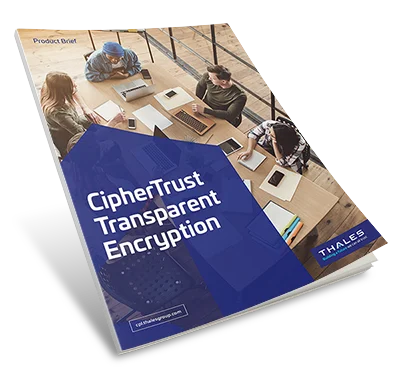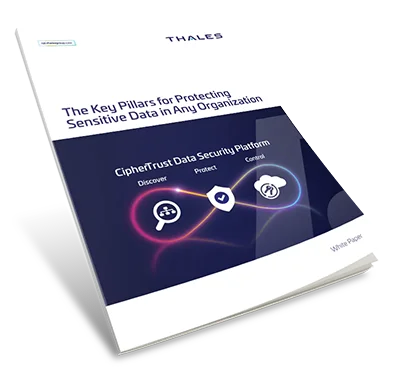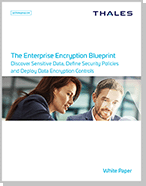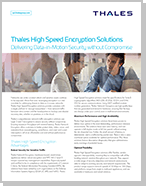Best Practices
Das brasilianische allgemeine Datenschutzgesetz (LGPD) schreibt bewährte Verfahren für die Datensicherheit personenbezogener Daten vor und stellt fest, dass anonymisierte personenbezogene Daten nicht mehr in den Geltungsbereich des Gesetzes fallen, wenn sie von denjenigen, die sie erhalten könnten, nicht ohne weiteres in ihren ursprünglichen Zustand zurückversetzt werden können.
Zu den besten Praktiken für die Datensicherheit gehören immer:
- Datenerkennung und -klassifizierung
- Kontrolle des Benutzerzugriffs auf die Daten
- Verschlüsselung oder Tokenisierung der Daten
- Schutz und Verwaltung der zur Verschlüsselung der Daten verwendeten Schlüssel
- Protokollierung von Datenzugriffsereignissen
Thales verfügt über jahrelange Erfahrung in der Unterstützung von Unternehmen bei der Umsetzung dieser Best Practices zur Einhaltung des LGDP.
Datenerkennung und -klassifizierung
Beim Schutz sensibler Daten muss zunächst herausgefunden werden, wo im Unternehmen sich diese Daten befinden. Anschließend müssen diese Daten als sensibel klassifiziert und typisiert werden (z. B. PII, Finanzdaten, IP, HHI, vertrauliche Kundendaten usw.), damit Sie die am besten geeigneten Datenschutztechniken anwenden können. Außerdem ist es wichtig, die Daten regelmäßig zu überwachen und zu bewerten, damit neue Daten nicht übersehen werden und Ihr Unternehmen nicht gegen Bestimmungen verstößt.
CipherTrust Data Discovery and Classification von Thales erkennt schnell und präzise strukturierte sowie unstrukturierte Daten on-premises und in der Cloud. Diese Lösung unterstützt sowohl agentenlose als auch agentenbasierte Bereitstellungsmodelle. Sie verfügt über integrierte Templates, die eine schnelle Identifizierung regulierter Daten ermöglichen, Sicherheitsrisiken sichtbar machen und dazu beitragen, Lücken bei der Einhaltung von Bestimmungen aufzudecken. Ein straffer Workflow zeigt auf, wo die Sicherheitslücken liegen, und reduziert die Zeit, die für deren Behebung aufgewendet werden muss. Detaillierte Berichte unterstützen Compliance-Programme und erleichtern die Kommunikation auf Geschäftsleitungsebene.
Leistungsstarke Zugriffsverwaltung und Authentifizierung
Die Zugriffsverwaltungs- und Authentifizierungslösungen von Thales bieten die erforderlichen Sicherheitsmechanismen und Berichtsfunktionen, die Unternehmen für die Einhaltung von Datensicherheitsvorschriften benötigen. Unsere Lösungen schützen sensible Daten, indem Sie geeignete Zugriffskontrollen durchsetzen, sobald Benutzer auf Anwendungen zugreifen, in denen sensible Daten gespeichert sind. Sie unterstützen eine große Bandbreite an Authentifizierungsmethoden sowie richtlinien- und rollenbasierten Zugriff und helfen Unternehmen dabei, das Risiko von Datenschutzverletzungen aufgrund kompromittierter oder gestohlener Zugangsdaten oder deren Missbrauch durch Insider zu senken.
Dank intelligentem Single-Sign-on und Step-up-Authentifizierung können Organisationen die Benutzerfreundlichkeit erhöhen. Endbenutzer müssen sich nur bei Bedarf authentifizieren. Unternehmen können mithilfe umfangreicher Berichtsfunktionen detaillierte Audit-Protokolle aller Zugriffs- und Authentifizierungsereignisse erstellen. So ist die Einhaltung zahlreicher Vorschriften gewährleistet.
Schutz sensibler Data-at-Rest
Die CipherTrust Data Security Platform ist eine integrierte Suite datenzentrierter Sicherheitsprodukte und -lösungen, die Erkennung, Schutz und Kontrolle von Daten auf einer einzigen Plattform vereint.
- Erkennen: Ein Unternehmen muss in der Lage sein, Daten dort zu erkennen, wo sie sich befinden, und diese zu klassifizieren. Diese Daten können in unterschiedlichen Formen vorliegen: Dateien, Datenbanken, Big Data, und sie können on-premises, in der Cloud oder als Sicherungskopien gespeichert sein. Datensicherheit und die Einhaltung von Vorgaben beginnt damit, gefährdete sensible Daten zu finden, bevor Hacker oder Prüfer dies tun. Mithilfe der CipherTrust Data Security Platform erhalten Unternehmen mittels effizienter Datenerkennung, -klassifizierung und Risikoanalysen einen vollständigen Überblick über Ihre sensiblen Daten on-premises und in der Cloud.
- Schützen: Sobald ein Unternehmen weiß, wo sich seine sensiblen Daten befinden, können Schutzmaßnahmen wie Verschlüsselung oder Tokenisierung ergriffen werden. Damit sensible Daten erfolgreich durch Verschlüsselung und Tokenisierung gesichert werden können, müssen die entsprechenden kryptographischen Schlüssel ebenfalls vom Unternehmen gesichert, verwaltet und kontrolliert werden. Die CipherTrust Data Security Platform stellt umfangreiche Datensicherheitsfunktionen bereit. Dazu gehören Verschlüsselung auf Dateiebene mit Zugriffskontrollen, Verschlüsselung auf Anwendungseben, Datenbankverschlüsselung, statische Datenmaskierung, Tokenisierung ohne Vault mit richtlinienbasierter dynamischer Datenmaskierung sowie Tokenisierung mit Vault zur Unterstützung einer Vielzahl an Anwendungsfällen im Zusammenhang mit Datenschutz.
- Kontrolle: Das Unternehmen ist verpflichtet, den Zugriff auf seine Daten zu kontrollieren und die kryptographischen Schlüssel zentral zu verwalten. Alle Bestimmungen und Vorschriften zur Datensicherheit verlangen von Unternehmen, dass sie sowohl berechtigten als auch unbefugten Zugriff auf Daten und kryptographische Schlüssel erkennen, kontrollieren und melden. Die CipherTrust Data Security Platform bietet robuste Schlüsselverwaltung für Unternehmen unabhängig vom Cloud-Anbieter und für verschiedene hybride Cloud-Umgebungen. So können kryptographische Schlüssel zentral verwaltet und Sicherheitsrichtlinien erstellt werden, damit Unternehmen sensible Daten in der Cloud, on-premises und in hybriden Umgebungen kontrollieren und schützen können.
- Überwachen: Schließlich muss das Unternehmen auch den Zugriff auf sensible Daten überwachen, um laufende oder kürzlich stattgefundene Angriffe böswilliger Insider, privilegierte Nutzer, ATPs und sonstige Cyberbedrohungen zu erkennen. Die Protokolle und Berichte von CipherTrust Security Intelligence optimieren die Compliance-Berichterstattung und beschleunigen die Erkennung von Bedrohungen mithilfe führender SIEM-Systeme (Security Information and Event Management). Diese Lösung ermöglicht eine sofortige automatische Eskalation und Reaktion auf unberechtigte Zugriffsversuche und stellt alle Daten bereit, die zur Erstellung von Verhaltensmustern erforderlich sind, um verdächtige Nutzungen durch autorisierte Benutzer zu identifizieren.
Schutz sensibler Data-in-Motion
Die High Speed Encryptors (HSEs) von Thales bieten eine netzwerkunabhängige Verschlüsselung für Data-in-Motion (Ebene 2, 3 und 4), die die Sicherheit der Daten auf dem Weg von Standort zu Standort oder von on-premises zur Cloud und zurück gewährleistet. Mit unseren HSE-Lösungen können Kunden Daten, Videos, Sprach- und Metadaten besser vor Lauschangriffen, Überwachung und offenem und verborgenen Abfangen schützen – zu einem günstigen Preis, ohne das Abstriche bei der Leistung gemacht werden müssen.
Schutz kryptographischer Schlüssel
Luna-HSM von Thales bieten eine gehärtete, manipulationssichere Umgebung unter anderem für sichere kryptographische Verarbeitung, Schlüsselerstellung und -schutz sowie Verschlüsselung. Luna-HSM sind in drei nach FIPS 140-2 zertifizierten Formfaktoren erhältlich und unterstützen zahlreiche unterschiedliche Bereitstellungsszenarien.
Außerdem können Sie mit Luna-HSM:
- Schlüssel für Root- und Zertifizierungsstellen erstellen und schützen und so PKI in unterschiedlichen Anwendungsfällen unterstützen
- Ihren Anwendungscode signieren, damit sichergestellt ist, dass Ihre Software sicher, unverändert und authentisch bleibt.
- digitale Zertifikate für die Berechtigungsprüfung und Authentifizierung proprietärer elektronischer Geräte für IoT-Anwendungen und sonstige Netzwerkbereitstellungen erstellen.

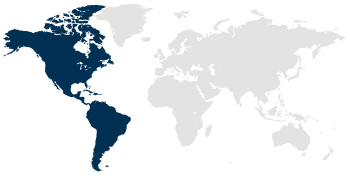 Thales kann Unternehmen dabei unterstützen, das brasilianische LGPD einzuhalten und Geldstrafen und Benachrichtigungen über Datenschutzverletzungen durch bewährte Verfahren zu vermeiden:
Thales kann Unternehmen dabei unterstützen, das brasilianische LGPD einzuhalten und Geldstrafen und Benachrichtigungen über Datenschutzverletzungen durch bewährte Verfahren zu vermeiden: